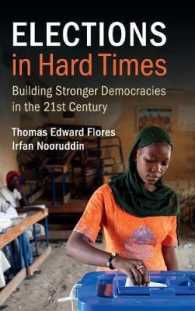- ホーム
- > 洋書
- > 英文書
- > Politics / International Relations
Full Description
In the this collection, International Governance, Regimes, and Globalization, the writers explore international relations and globalization by using specific examples from Beijing and Taipei. In December 1949, when China was politically divided the People's Republic of China (PRC) central government was in control of most resources, tangible and intangible. For that reason, our unit of analysis has to be the state, meaning a government or a politically organized body. With the rise of civil society at both national and international levels, applying the international/global governance theory should be closer to reality, because we have to look at both the state and non-state-sponsored dimensions, which are more complex and complicated.
Indeed, international/global governance could become a new school of thought and will continue to expand as academics explore. For example, neo-liberalism primarily focuses on market and contract. When people buy and sell something, they are in a market. In other words, politics is the superstructure of economics or as Karl Marx said what prevails in economy will ultimately prevail in politics. In a sense, subscribers to this school of thought are Marxian. However, the study of international/global governance embraces the non-state sponsored dimension. Hence, it is broader than that of the neo-liberalism school of thought.
Contents
Chapter 1 Ch. 1 International Governance and Globalization
Chapter 2 Ch. 2 Norms, Power, the Power of Norms, & Community: Essentials of International Governance
Chapter 3 Ch. 3 Does Beijing Understand International Regimes?
Chapter 4 Ch. 4 Beijing's Hegemony under International Relations and International Regimes and postscript on the World Health Organization
Chapter 5 Ch. 5 Adaptation and Strategic Calculation: China's Participation in International Regimes and Institutions
Chapter 6 Ch. 6 The PRC's Governance Diplomacy in the Asia-Pacific Region
Chapter 7 Ch. 7 Governing the Taiwan Strait in a Globalizing World: Using Military Adversary Regime and Non-military Adversary Regimes as a Tool
Chapter 8 Ch. 8 Globalization, East Asia, and the Future of Global Politics
Chapter 9 Ch. 9 Universality Claims and "Failures" Across Cultures: Liberalism vs. Asian Values







